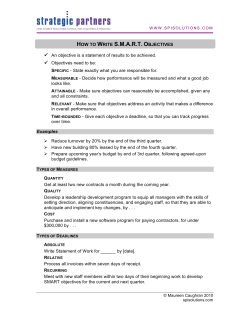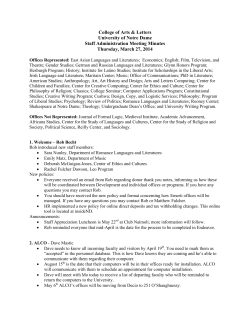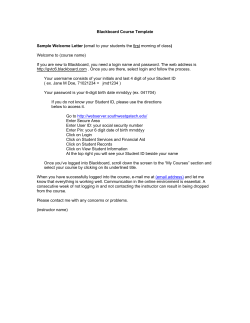
COLLEGE OF ARTS AND LETTERS UNDERGRADUATE STUDENT HANDBOOK
COLLEGE OF ARTS AND LETTERS UNDERGRADUATE STUDENT HANDBOOK This document provides information on policies and procedures for undergraduate students in the College of Arts and Letters. Students are advised to consult the University Catalog and their major department for additional policies and procedures. Undergraduate departments and programs in the College of Arts and Letters include: Art Communication Studies English Liberal Studies Modern Languages and Literatures Music Philosophy Television, Film, & Media Studies Theater Arts and Dance Administration - College of Arts and Letters NAME Dr. 3HWHU0F$OOLVWHU Dr. David Connors Flora SaavedraHernandez Rhonda Roquemore POSITION Dean Acting Associate Dean Assistant to the Dean Assistant to the Associate Dean OFFICE MUS 228 MUS 230 TELEEPHONE 323.343.4001 323.343.4004 MUS 227 323.343.4001 MUS 231 323.343.4004 Admission - Special Requirements Students admitted to the university are automatically admitted to the department for which they have indicated a major. Students accepted into the Music Department are accepted for the Bachelor of Arts option and must audition separately for acceptance into the Bachelor of Music program. While this audition normally occurs at the junior level, students may elect to audition at any time prior to junior standing. Academic Advisement All students are expected to meet regularly with advisors in their departments. It is most important that all new students complete a program of study with their major advisors. These programs of study constitute contracts with the university and help to ensure that students who maintain continuing status cannot be held to additional requirements. Official undergraduate records are maintained in department offices. COLLEGE OF ARTS AND LETTERS UNDERGRADUATE STUDENT HANDBOOK The major advisor provides assistance in the following areas: Requirements for the Major Evaluation of Transfer Credit for Courses in the Major Assistance with Petitions and other processes including Graduation Checks Questions Relating to University and Department Policies and Procedures The major advisor may (or may not) provide career counseling. Students pursuing Liberal Studies with the objective of a Multiple Subject Teaching Credential should meet with an advisor before enrolling for classes. General Education requirements are different for Liberal Studies majors in this option. In addition to the department advisors: For all GE advisement and first time GE transfer students; probation and disqualification/reinstatement workshops for students ----please go to the University Academic Advisement Center (UAAC). Located: Palmer Wing of the University Library, Room 1040A, Ext. 3150. Scholarships Many scholarships and other financial assistance programs are available. Students should contact the Financial Aid Office and the Scholarship Office for more information. In addition, most departments in the College of Arts and Letters offer scholarships to undergraduate and graduate students. Students should consult an advisor in their department, as well as the Scholarship Office, for information on applications and deadlines. General Policies and Procedures Introduction to Higher Education Courses All undergraduate students in Arts and Letters who do not have a bachelor’s degree, and who enter Cal State LA in Fall, 1997 or later, and who are subject to the 1997 and later General Education Catalog are required to complete an Introduction to Higher Education course. This requirement must be completed no later than the second quarter of attendance at CSULA. These courses introduce students to the policies and procedures of the University, to the Library, College and campus events and resources, and the critical, analytical skills and tools they will need to succeed. Freshmen are required to successfully complete AL 101: Introduction to Higher Education in Arts and Letters (4 units). University Writing Requirements All CSULA students who enter in Summer 1984 or later, and are pursuing a degree or credential, are required to pass the Writing Proficiency Examination (WPE) prior to the completion of 135 quarter units. ENGL 101 and 102 are prerequisites to the examination. Transfer students who have completed 135 units upon entrance must COLLEGE OF ARTS AND LETTERS UNDERGRADUATE STUDENT HANDBOOK pass the WPE during their first quarter of residence at Cal State LA. Students who have satisfied the upper division writing proficiency requirement at another CSU campus shall be considered to have met the CSULA requirement. General Education Upper Division Themes Students are required to complete a 12-unit Upper Division Theme as part of the General Education Program. Completion of the Lower Division Basic Subjects (Block A) is a prerequisite to all upper division theme courses. Consult the University Catalog for a description of the themes. Students must select theme courses outside their major departments. This is true even if the course is cross-listed with a different department. For example, students in Television, Film and Media Studies could not take COMM/ENGL 385: Sex and Gender in Language and Literature as their humanities option in Theme C because Communication is in their major department, Communication Studies. Adding a Class Generally, students may add classes through GET. If the instructor gives students permits to add, the students must still go through GET. Receipt of a Permit to Add is not sufficient to actually add the class; students must still go through GET to insure enrollment. (The permit is only a placeholder, authorizing formal registration). Course Loads in Excess of 18 units In some circumstances, students may petition to enroll in more than 18 units (an overload) in a given quarter. To do this, they must submit a petition to the Registrar; that petition must be signed by the Department Advisor, Department Chair, and Associate Dean. The following guidelines govern these petitions: 1. No overloads for freshmen. In the same sense, academic advisors are discouraged from allowing first quarter transfer students from taking overloads. All students must establish a history of success at CSULA with a regular full load (up to 18 units), before attempting to be successful with an overload (in excess of 18 units). 2. No overloads are approved if a student has less than a cumulative 3.0 GPA, and no overloads of 20+ units are approved if a student has a cumulative GPA below 3.5, barring documentation of special or extreme circumstances. 3. No overloads are approved if the student has a record (more than two quarters) of drops, INCs, or Ws. 4. Overloads of 24 units must be accompanied by documentation of an extreme extenuating circumstance. 5. The rationale that some classes are "only (fill in the blank: _________ 'only' an art classes, dance classes, PE classes, etc.)" is not meritorious. Classes are classes, and contact hours are contact hours. There are no “free pass” classes COLLEGE OF ARTS AND LETTERS UNDERGRADUATE STUDENT HANDBOOK that make an overloaded inevitable or justifiable because of a mistaken assumption of their ease. 6. Students requesting overloads must list all the classes they plan to take, or provide copies of their schedules. 7. Students in their last quarters before graduation are granted more flexibility on these guidelines than all others. 8. Students claiming that they want to register to secure course credit for work already completed need documentation of this from the instructor who will ultimately assign the grade. Late Adds Students are responsible for ensuring that their names appear on the rosters for their classes. There are at least two opportunities to verify enrollment. Students may review their enrollment status using the GET system. The instructor will also read the roll on the first day of class. Students who add classes after the quarter has begun must check with the instructor to ensure that their enrollment has been entered in the system. The Add Period generally extends through the first two weeks of the quarter. See the quarterly Schedule of Classes for the Late Add Deadline. After the enrollment period has closed, requests for Late Adds must be signed by the instructor, the Department Chair and the Associate Dean. The reasons for not having verified enrollment earlier must be stated clearly on the Add Form. Rationales stating that the instructor was to have completed the enrollment must be accompanied by a note from the instructor. Requests for Late Adds may require a personal interview with the Associate Dean. [The approval of Late Adds is not guaranteed. The process of approval has become much more rigorous. More requests for Late Adds are denied than those that are approved. It is imperative that students ADD classes during the specified Add Period.] Emergency Withdrawals Drops from classes after the 7th week are only for serious and compelling reasons that are beyond the student's control. Withdrawal at this time is ordinarily from all classes. (See the 2009-20011 University Catalog, p. 93). The Emergency Withdrawal period is set each quarter. Students should consult the quarterly Schedule of Classes for specific information and dates. For withdrawals during this period, students must obtain the signature of the instructor, the Department Chair and the Associate Dean. The office of the Associate Dean is located in Room 231 in the Music Building. Written documentation verifying the serious and compelling reasons for the request must be attached to the drop form. This documentation may take the following forms: COLLEGE OF ARTS AND LETTERS UNDERGRADUATE STUDENT HANDBOOK Work related withdrawals require a signed letter from the employer or supervisor on letterhead, which shows hours and dates of employment and the date the work schedule was begun. Medical problems must be described in a note by the attending physician on letterhead or prescription form. The date on which the problem occurred and the period of treatment should be stated. Other reasons for dropping must be explained briefly on the form. These cases may also require additional documentation and discussion with the Associate Dean. Please note: The Late Withdrawal period is designed to assist students who have encountered circumstances beyond their control. This is not a period for students to selectively drop classes that they are failing or will result in a less than desirable grade. Transfer Student Information All transfer students to the College of Arts and Letters should meet with a department advisor upon notification of acceptance or, at the very latest, at the beginning of their first quarter of attendance. Students should bring copies of their transcripts to assist the advisor in determining transfer credit for major courses. Transfer credit for general education courses will be determined by the University, and the student will be notified by mail of the results of that evaluation. Specific courses in the major which have been formally articulated with the transfer institution are automatically counted toward major requirements (CAN). Courses taken at a community college may, with advisor approval, count toward 100 or 200 level course requirements at CSULA. Courses taken at community college may not be used for upper division unit credit at CSULA. If the advisor determines that subject competency has been met for a particular course, the student will still be required to have upper division units in place for the relevant requirement. In general, the advisor will help the student determine a suitable substitute course. Upper division courses taken at institutions which grant baccalaureate degrees may substitute for requirements at CSULA with advisor approval. Transfer students may be required to undergo diagnostic examinations upon entrance to the program and should consult with their advisor about any such requirements. Requirements for the Dean's List All undergraduate students in the College of Arts and Letters are eligible to be named to the Dean's List for each quarter in which they achieve the requisite requirements. Those requirements are: Minimum GPA of 3.4 for the quarter COLLEGE OF ARTS AND LETTERS UNDERGRADUATE STUDENT HANDBOOK Enrolled in at least 12 units GPA in the upper five percent of students within the College of Arts and Letters for the quarter. This also applies to graduate students seeking a second or subsequent baccalaureate Students who achieve the Dean's List during any quarter in the year are recognized at the annual Honors Convocation. Students will not be added retroactively to the Dean’s List on the basis of completion of work where the original grade was I (Incomplete).
© Copyright 2025





















